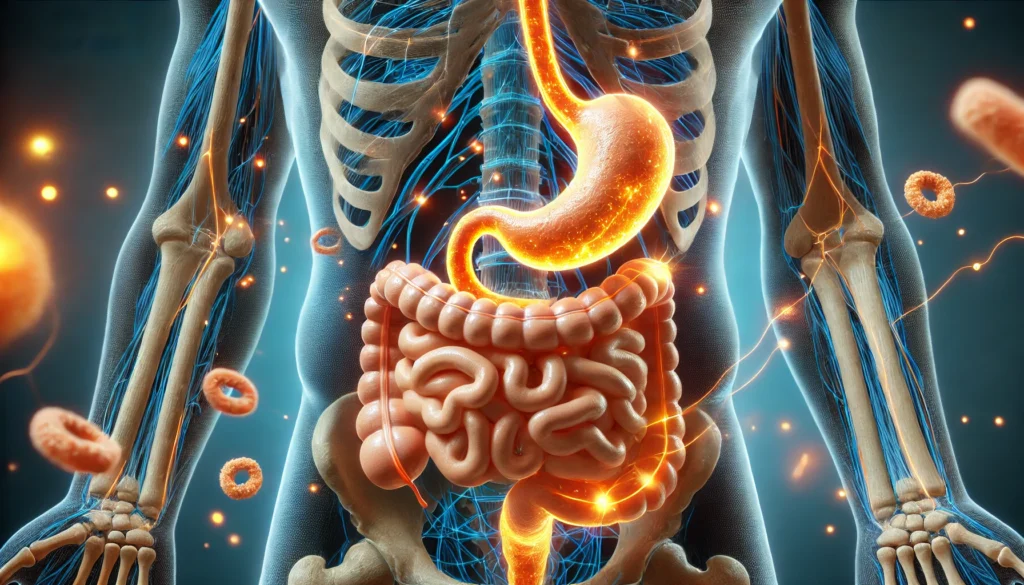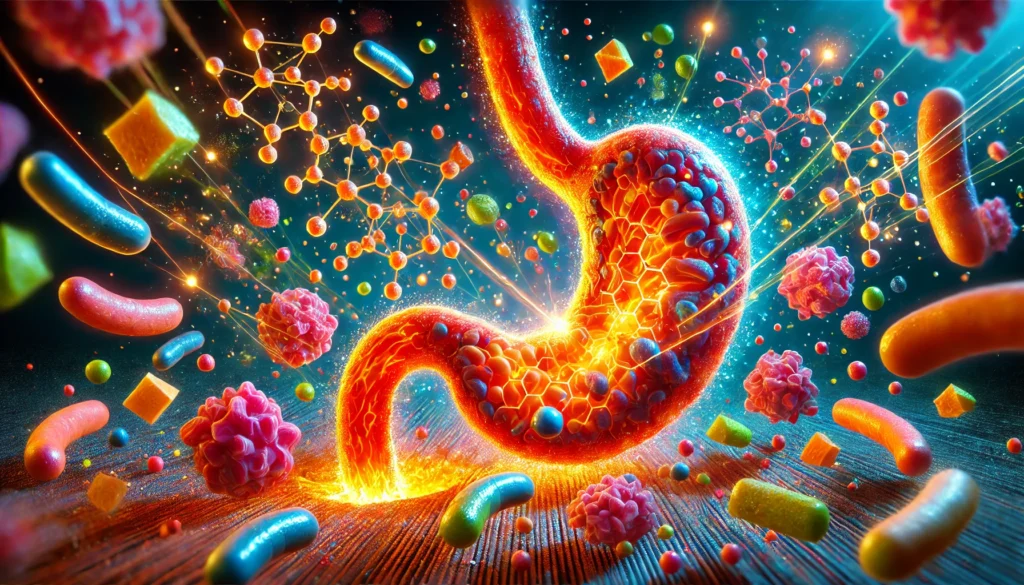Understanding Digestive Enzymes and Their Role in the Body
Digestive enzymes play a crucial role in breaking down food into absorbable nutrients that fuel the body’s metabolic processes. These natural stomach enzymes facilitate the breakdown of proteins, fats, and carbohydrates, ensuring that the body efficiently absorbs essential nutrients. Without adequate digestive enzymes, food may pass through the digestive tract without proper breakdown, leading to discomfort, nutrient deficiencies, and inefficient digestion. Enzyme supplementation to enhance digestion has gained attention for its potential to support individuals with digestive inefficiencies and certain medical conditions.
You may also like: How to Improve Nutrient Absorption: Unlock the Benefits of Bioavailable Nutrients for Holistic Wellness
A healthy digestive system naturally produces enzymes such as amylase, protease, and lipase, which respectively break down carbohydrates, proteins, and fats. However, various factors, including aging, stress, and certain medical conditions, can reduce the body’s ability to produce these essential enzymes. The benefits of digestive enzymes extend beyond just aiding digestion; they also support gut health, reduce bloating, and promote overall well-being.

The Benefits of Digestive Enzymes for Optimal Gut Health
The advantages of taking a digestive enzymes supplement extend far beyond improved digestion. One of the most notable benefits of digestive enzymes is their ability to reduce bloating and digestive discomfort. Individuals who suffer from conditions like irritable bowel syndrome (IBS) or lactose intolerance often experience bloating due to the incomplete breakdown of certain foods. Supplementing with digestive enzymes for gas flatulence can significantly alleviate symptoms and improve overall gut function.
Another key benefit of digestive enzymes is their role in nutrient absorption. When food is not adequately broken down, essential vitamins and minerals may pass through the digestive tract unabsorbed. This can lead to deficiencies that impact energy levels, immune function, and overall health. Taking the best digestive enzymes can ensure that the body maximizes nutrient uptake from food, preventing malnutrition and promoting vitality.
How to Increase Digestive Enzymes Naturally
While enzyme supplementation is highly beneficial, it is also possible to enhance enzyme production through dietary and lifestyle modifications. Consuming plants rich in enzymes, such as pineapples, papayas, and fermented foods, can naturally boost enzyme levels in the digestive tract. These foods contain bromelain, papain, and other natural digestive enzymes that support the body’s ability to break down food effectively.
Hydration also plays a crucial role in enzyme activity. Drinking sufficient water throughout the day ensures that digestive enzymes function optimally, facilitating smooth digestion. Additionally, practicing mindful eating, such as chewing food thoroughly, stimulates the production of saliva, which contains essential enzymes that kick-start digestion before food even reaches the stomach.
When to Take Digestive Enzymes for Maximum Effectiveness
To reap the full benefits of digestive enzymes, it is essential to know when to take digestive enzymes. For most individuals, taking enzyme supplements before meals is the most effective strategy. This timing allows the enzymes to be present in the stomach as food enters, ensuring efficient breakdown from the start of the digestive process.
However, different types of enzyme supplements have varying instructions. For instance, protease-rich enzyme supplements that break down protein may be more effective when taken with high-protein meals, while lipase enzymes that digest fats should accompany fatty meals. Those wondering, “Can you take digestive enzymes after eating?” should note that while post-meal consumption can still provide benefits, pre-meal supplementation typically yields superior results.
Are Digestive Enzymes Safe? Understanding Potential Side Effects
A common question among those new to enzyme supplementation is, “Are digestive enzymes safe?” The answer is generally yes—when taken appropriately, digestive enzyme supplements are safe and well-tolerated by most individuals. However, like any supplement, they can have potential side effects. Some individuals may experience mild digestive enzymes side effects such as nausea, diarrhea, or cramping, particularly when first introducing the supplement.
Additionally, taking excessively high doses of enzyme supplements can lead to digestive discomfort. To prevent this, it is essential to follow dosage recommendations and consult a healthcare professional before starting a digestive enzymes supplement regimen. Those with medical conditions such as pancreatitis or ulcers should seek medical advice to ensure that supplementation is appropriate for their specific health needs.
The Best Rated Digestive Enzymes for Different Digestive Concerns
Choosing the best digestive enzymes requires an understanding of one’s unique digestive needs. For individuals experiencing bloating and gas, digestive enzymes for gas flatulence that contain alpha-galactosidase can help break down complex carbohydrates found in beans and cruciferous vegetables. Those with lactose intolerance should seek supplements containing lactase, which aids in the digestion of dairy products.
Individuals looking for a general digestive boost may benefit from broad-spectrum enzyme supplements that contain a combination of amylase, protease, and lipase. The best rated digestive enzymes often include additional ingredients like probiotics and prebiotics, which further enhance gut health and promote digestive balance.

Frequently Asked Questions (FAQ) About Digestive Enzymes
1. Can enzyme supplementation to enhance digestion replace a balanced diet?
While a digestive enzymes supplement can significantly improve digestion and nutrient absorption, it is not a substitute for a balanced diet. Natural digestive enzymes from whole foods play a crucial role in breaking down food and optimizing gut health. Enzyme supplements work best when combined with a nutrient-dense diet rich in plants rich in enzymes, such as pineapples, papayas, and fermented foods. Additionally, consuming fiber-rich foods supports digestive health by promoting beneficial gut bacteria. Supplementing with enzymes should be seen as a complementary strategy rather than a replacement for healthy eating habits.
2. Will taking digestive enzymes reduce your ability to digest food naturally over time?
A common misconception is that enzyme supplementation might make the body reliant on external enzymes, weakening its own production. However, research indicates that using enzyme supplements does not suppress natural enzyme secretion in a healthy digestive system. Instead, enzyme supplementation to enhance digestion can help compensate for temporary deficiencies caused by aging, stress, or medical conditions. When taken appropriately, enzyme supplements support rather than hinder the body’s digestive processes. Individuals concerned about long-term effects should focus on how to increase digestive enzymes naturally through diet and lifestyle modifications alongside supplementation.
3. How do I know if I need a digestive enzymes supplement?
Signs that you may benefit from dietary enzymes supplements include bloating, gas, nutrient deficiencies, and difficulty digesting certain foods like dairy or high-fat meals. If you frequently experience digestive enzymes bloating, discomfort after eating, or symptoms of food intolerance, a targeted enzyme supplement may provide relief. Additionally, individuals with conditions like IBS, pancreatitis, or lactose intolerance may find enzyme supplementation especially beneficial. Consulting a healthcare provider can help determine whether enzyme supplements are appropriate for your specific digestive needs. Monitoring how your body responds to different foods can also indicate whether enzyme supplementation is necessary.
4. Do digestive enzymes make you poop more, and what is their effect on bowel movements?
Digestive enzymes do not inherently increase the frequency of bowel movements, but they can promote more efficient digestion, leading to more regular and formed stools. For individuals experiencing constipation due to poor digestion, enzyme supplementation may help by breaking down food more effectively, reducing undigested particles that contribute to sluggish digestion. Conversely, taking an excessive amount of enzyme supplements may result in loose stools or mild diarrhea as the digestive process is accelerated. If bowel movement changes occur, adjusting the dosage or type of enzyme supplement may help maintain balance. Understanding when to take digestive enzymes is key to optimizing their effects on digestion and bowel regularity.
5. Can digestive enzymes cause gas or bloating?
While digestive enzymes are often used to alleviate bloating and gas, in some cases, they may initially cause mild digestive discomfort as the body adjusts. This can occur if the body is not used to efficiently breaking down certain food components, such as lactose or complex carbohydrates. Choosing the best digestive enzymes for your specific needs can help reduce unwanted effects. For example, individuals sensitive to dairy should look for lactase-containing enzyme supplements, while those who struggle with beans or cruciferous vegetables should opt for enzymes like alpha-galactosidase. Over time, regular use of enzymes can help improve digestion and reduce bloating rather than cause it.
6. Should I take digestive enzymes with every meal?
The frequency of enzyme supplementation depends on individual digestive needs and dietary habits. Those with chronic digestive concerns or enzyme deficiencies may benefit from taking enzymes with most meals, particularly when consuming foods that are difficult to digest. However, taking digestive enzymes with every meal is not always necessary if your digestion functions well with most foods. Many people find that supplementing with enzymes for high-fat, protein-rich, or dairy-heavy meals provides the best results. If unsure, it’s best to experiment with different timings and observe how your body responds.
7. What happens if you take digestive enzymes after eating instead of before?
Taking enzyme supplements after eating can still provide some benefits, but pre-meal consumption is generally more effective. When digestive enzymes are taken before meals, they are already active in the stomach by the time food arrives, leading to a smoother breakdown process. If taken after eating, the enzymes may still assist in digestion, but they may not work as efficiently since food has already begun breaking down through mechanical and chemical processes. If you forget to take your enzymes before a meal, taking them shortly after eating can still aid digestion but with slightly diminished effectiveness.
8. How many digestive enzymes can I take a day, and is there an upper limit?
The recommended dosage of enzyme supplements varies based on individual needs, the type of enzymes used, and the formulation of the supplement. Most enzyme products provide guidelines on how many digestive enzymes can I take a day based on meal composition and digestive health status. Taking too many enzymes in one sitting may cause digestive discomfort, including cramping or diarrhea. For most individuals, following the manufacturer’s dosage instructions and gradually adjusting as needed is the best approach. Consulting a healthcare professional can provide personalized recommendations for enzyme intake.
9. Could the body still digest food without enzymes?
The body requires enzymes to break down food efficiently, but in cases of enzyme deficiency, digestion still occurs—albeit less effectively. Without sufficient natural stomach enzymes, undigested food particles can enter the intestines, leading to discomfort, bloating, and poor nutrient absorption. Certain conditions, such as pancreatic insufficiency, can significantly impair enzyme production, making enzyme supplementation necessary for proper digestion. While some enzymatic activity occurs naturally in food, it is typically insufficient for complete digestion without bodily-produced enzymes. Ensuring that the digestive system has an adequate supply of enzymes—whether from natural sources or supplements—is essential for optimal gut function.
10. How to increase pancreatic enzymes naturally without supplementation?
There are several ways to support pancreatic enzyme production naturally, including dietary choices and lifestyle modifications. Consuming foods that naturally contain enzymes, such as raw fruits, fermented vegetables, and sprouted grains, can enhance digestion and stimulate enzyme activity. Reducing processed foods and excessive sugar intake also helps maintain a healthy pancreas, which plays a central role in enzyme production. Staying hydrated, managing stress, and engaging in regular physical activity can further promote digestive health and enzyme efficiency. While dietary approaches are beneficial, individuals with chronic enzyme deficiencies may still require enzyme supplements to support their digestion fully.

Conclusion: Enhancing Digestive Health with Natural and Supplemented Enzymes
Understanding the importance of digestive enzymes is crucial for maintaining optimal health and well-being. Whether through natural stomach enzymes or enzyme supplementation to enhance digestion, supporting the body’s ability to break down food efficiently can lead to improved nutrient absorption, reduced bloating, and better overall digestive function.
By incorporating plants rich in enzymes into one’s diet, staying hydrated, and practicing mindful eating, individuals can naturally boost their digestive enzyme production. However, for those with persistent digestive concerns, the use of a high-quality digestive enzymes supplement can provide significant relief and promote long-term gut health.
Ultimately, digestive enzyme supplementation offers a practical and effective solution for those looking to optimize their digestion and overall health. By understanding when to take digestive enzymes, selecting the best digestive enzymes for specific needs, and being mindful of digestive enzymes side effects, individuals can make informed choices that support their well-being naturally and effectively.
digestive health, digestive enzyme supplements, natural stomach enzymes, enzyme supplementation, benefits of digestive enzymes, enzyme supplements for bloating, best digestive enzymes for gas, enzyme supplementation for digestion, digestive enzymes for nutrient absorption, how to increase digestive enzymes naturally, when to take digestive enzymes for best results, digestive enzymes side effects and safety, choosing the best digestive enzyme supplement, enzymes in food for better digestion, do digestive enzymes work effectively, digestive enzymes and gut health, benefits of natural digestive enzymes, can digestive enzymes cause gas, enzyme supplements for bloating relief, best rated digestive enzymes for digestion
Further Reading:
What Are The Benefits Of Digestive Enzymes
Digestive Enzyme Supplementation in Gastrointestinal Diseases
Digestive Enzymes and Digestive Enzyme Supplements
Disclaimer
The information contained in this article is provided for general informational purposes only and is not intended to serve as medical, legal, or professional advice. While NewsHealthWatch strives to present accurate, up-to-date, and reliable content, no warranty or guarantee, expressed or implied, is made regarding the completeness, accuracy, or adequacy of the information provided. Readers are strongly advised to seek the guidance of a qualified healthcare provider or other relevant professionals before acting on any information contained in this article. NewsHealthWatch, its authors, editors, and contributors expressly disclaim any liability for any damages, losses, or consequences arising directly or indirectly from the use, interpretation, or reliance on any information presented herein. The views and opinions

